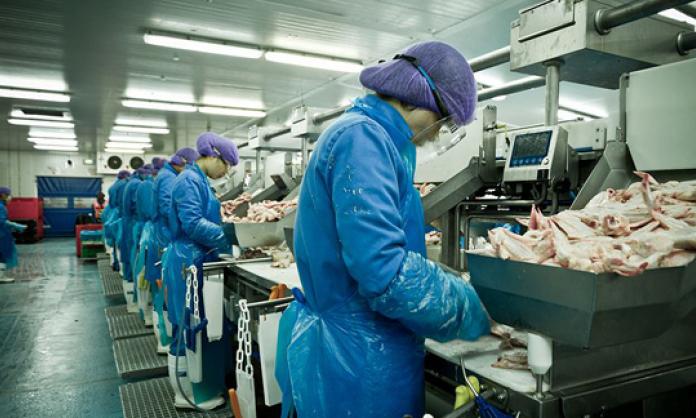Reports about the abuse of migrant workers have been regularly surfacing in recent months. Now, workers at a chicken factory just outside Bendigo are speaking out about what’s going on in their workplace.
Hazeldene’s Chicken is one of the largest employers in central Victoria. Its Bendigo factory processes more than 500,000 chickens a week. The family-operated company has an annual revenue of more than $200 million. In Bendigo, the Hazeldenes wield serious influence.
John Hazeldene, son of the company’s founder, is managing director and company head. He sits on the Bendigo Business Council and sponsors the town’s annual Easter Festival, during which the streets are plastered with company ads.
“He’s the self-appointed ‘king of Bendigo’”, says Chris (not his real name), a National Union of Workers delegate at Hazeldene’s. “We struggle to get anything into the [Bendigo] Advertiser because John Hazeldene is mates with the editor. He thinks he owns the town and that anyone who works for him owes him a favour.”
As with all monarchs, Hazeldene’s fief is built on the immiseration of his subjects.
The Hazeldene’s factory employs around 350 process workers on a permanent full time or part time basis. However, according to Alycia Economidis, an organiser with the NUW, a second tier, numbering at least 200, work under very different conditions.
Alycia told Red Flag that Hazeldene’s engages contractors to employ a variety of visa holders, including those on 457, 417, student and spousal visas. “Many of these people are of Chinese, Vietnamese and Thai origins”, she said. “Many of them have had their jobs and even their personal security threatened if they make trouble.”
The union says it’s difficult to determine exactly how much these workers earn because they are paid in cash without being issued pay slips. “Many can be paid by piece rates instead of an hourly wage. We believe that people can be paid over the minimum wage sometimes and then the boss forces people to give them money back”, she said.
“It’s all piece rates”, agrees Chris, “and it’s all cash. Originally they were getting $15 per hour, which is well below the minimum wage. They then bumped it up to $17 or $18 per hour.”
But Chris said it is now common for $200 to $300 to be withheld from their pay each week for additional unexplained expenses.
He told Red Flag that these workers have to pay for company-provided buses to the factory from Melbourne, a journey that can take as long as two hours each way. “The driver works in the factory as well, and once they were all so sleep deprived that they actually rolled the bus. They still had to come in to work that day.”
“When I first became a delegate, many people worked as much as 14 or 15 hours a day. On a Friday they could be forced to stay there until there was no product left, which could take as long as 20 hours.”
When asked, the company has not denied that migrant workers are paid in cash and that they can work for 14 or 15 hours at a time. However, its “people and performance manager” recently told a Senate enquiry that these workers “are being paid appropriately”.
“None of them are in the union”, Chris said. Senior management are thought to hold backroom meetings with the workers to discourage them from joining. “When we tried to talk to them, one of the supervisors jumped on a chair and shouted ‘No one talk to the union!’”
When Chris asked one of the workers what would happen if they joined the union, he said, “I would lose my job, or worse”. Dylan Moroney, a young worker who was recently sacked without cause, knows something about how the company views union activists. Dylan was fired after working at Hazeldene’s for five months and 25 days. He had just five days left on his probationary period. According to the NUW, he was active in the union and the company knew about it.
The next few months will be an important time for Hazeldene’s workers. With their enterprise agreement set to expire at the end of October, the union expects that the company will try to use its precarious workforce to undermine a variety of existing conditions. It wants to introduce fixed-term contracts and broaden the scope of individual flexibility agreements to allow greater use of WorkChoices-style individual contracts.
Hazeldene’s isn’t afraid of a fight either, having locked out its entire workforce during bargaining in 2009. According to Alycia, the priority for the NUW is to figure out a way to unite the workforce. “The company has been good at dividing and ruling the workplace. People are broken into sections that have almost nothing to do with each other.”
Union members will also be pushing to get migrant workers into the union and fighting for an improvement in their wages and conditions. “A key part of this will be to win site rates in the next EBA”, Alycia said, “which would force Hazeldene’s to employ all workers on site at the same pay and conditions”.










